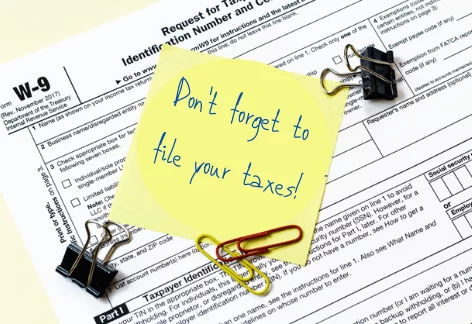According to the IRS, almost 14 million Americans fall behind on their taxes. If you have fallen behind, here is how to file back taxes with a professional attorney.
It is upsettingly easy to get on the IRS’s bad side. While we are reminded to judiciously file our taxes every year, there are circumstances – crises, unemployment, severe trauma, a rough move – under which something as seemingly inane as an income tax return can slip one’s mind.
Yet while simple forgetfulness or other innocuous reasons can lead to back taxes, the IRS takes them quite seriously. If given enough reason, the IRS will consider certain cases to be a matter of tax evasion, a federal felony. The IRS can pursue these cases quite aggressively.
But long before it does that, the IRS will remind taxpayers to file their tax returns, pay their taxes on time, and cover any tax debt they have. Failure to comply in one way or another can and will get you in hot water with the IRS – which can lead to hefty penalties and fines, restrictive liens on your property, and even tax levies.
Even if you haven’t earned enough in the last few years to owe income taxes, back taxes are something you will want to clear up as soon as possible to avoid penalties, and civil or criminal charges, and ensure that you get to collect on any tax credits you might be owed.
Why Would I Owe Back Taxes?
The IRS requires that taxpayers file a tax return if they owe any tax. For most individual taxpayers, these taxes generally include income taxes and applicable property taxes.
Self-employed individuals and business owners may owe more taxes, depending on the size and structure of their business. Some people don’t owe any tax, because they neither own property, nor earn enough of an income in a year to exceed the exemption limit.
However, it’s still a good idea to file a tax return even when you technically don’t owe any income tax. Not only might you be eligible for a tax credit/refund for certain circumstances (such as the coronavirus pandemic), but failing to file back taxes may affect your chances of getting a loan, protecting your social security benefits, and avoiding unnecessary penalties.
If you do owe taxes and fail to file a return, then the IRS may very well not catch you for some time. But when they do, you will likely be saddled with a hefty debt, made worse by serious fees and accrued interest.
It’s also often a good idea to double check with a professional tax attorney to ensure that you don’t owe taxes or are accidentally underreporting, as that may incur a greater tax bill than you were prepared for.
What Do I Need at Hand If I Want to File?
If you have missed a few tax returns over the last couple of years for one reason or another, don’t fret. While the IRS does aim to collect as many taxes as it can, it can only reasonably demand that taxpayers file back taxes for the last three years.
There are exceptions to this rule, such as obvious fraudulent and criminal behavior. This would give the IRS the means to demand documentation for all late returns.
On the other hand, they have a limit of six years in cases of large understatements of income, which is generally defined as about 25 percent of your gross income. If you’ve never filed a return to begin with, they may be able to demand that you file all of the returns you’ve missed.
If the IRS has no reason to believe that you were intentionally defrauding them, preparing the last three years’ tax returns should be enough to get you back on track. When you can locate the necessary documents to file all your back taxes, consider tracking those documents down and discussing your options with a tax professional.
Hiring a reputable tax law professional can help you expedite the process and ensure that the IRS doesn’t mistake any of your past tax behavior as criminal, as well as minimize how many back tax returns you’ll have to file.
What Documents Do I Need to File Back Taxes?
When preparing your back taxes, you will need the appropriate tax documents. That means, for example, that you would need the tax return forms for the years 2017-2018, 2018-2019, and 2019-2020. For most taxpayers, these are Form W-2 and Form 1099.
You will also want to prepare any relevant information pertaining to your earnings and losses in the past three years. This includes:
-
-
- Any large personal expenses
- Business expenses
- Donations to charity
- Costs related to your home
- Changes in property ownership (deeds etc.)
- Paystubs
- Bank statements
-
Once you have all the necessary documents on hand, it’s time to fill out those returns. The IRS provides resources to help taxpayers fill out their own tax returns, but you can also opt for professional services to get it done faster, and with greater accuracy.
Even simple errors could end up costing you in the long-run, and note that you will need to heed tax law changes as they occur from year to year, as only that year’s tax laws are applicable for any given tax return.
Once you’ve filled your forms, it’s time to mail them in. The IRS does not accept digital late tax returns. You need to print your forms out if you filled them electronically.
What If I’m Missing My Tax Documents?
If you do not have the tax return forms for the past three years, you can either ask your employer or contact the IRS directly, and fill out Form 4506-T, a Request for Transcript of Tax Return.
Tracking down other relevant documents might be a bit more complicated. You can ask for any relevant bank statements from your bank and contact human resources/the payroll department at your current and/or former jobs for your lost pay stubs.
If you’ve made improvements to your home, converted part of your home into a home office as a result of the pandemic, or incurred other significant work-related losses or costs, having the documentation on hand to prove these is also important.
Why File with a Professional Attorney?
Tax attorney services such as Rush Tax Resolution exist to help taxpayers navigate the IRS’s requirements and get back on the service’s good side, with as few penalties and costs as possible.
While you could sit back and fill out your tax returns yourself, even simple clerical errors might draw the IRS’s attention – especially on late tax returns, which it could see as inherently suspicious. The last thing you want is a drawn-out audit, and all the inconvenience it could bring.
Furthermore, tax professionals can ensure that you get every tax credit and tax refund you are eligible for, potentially helping you turn losses and deductibles into a boon. The more complicated or unusual your recent financial history, the more important it is to have a tax attorney to represent you and ensure that none of your past is misrepresented in any way.
If You Have a Tax Debt
If your returns end up revealing that you own some money to the IRS after all, working with a tax professional can be a great way to quickly resolve your debt with the IRS by setting up a reasonable short-term or long-term payment plan to minimize penalties and interest.
In cases where recent hardships have made it impossible for you to cover your tax debt, a tax professional’s services can help you navigate the complex path towards an Offer in Compromise with the IRS. If you’re worried about back taxes or aren’t sure where to begin filing them, contact Rush Tax Resolution for more information.

